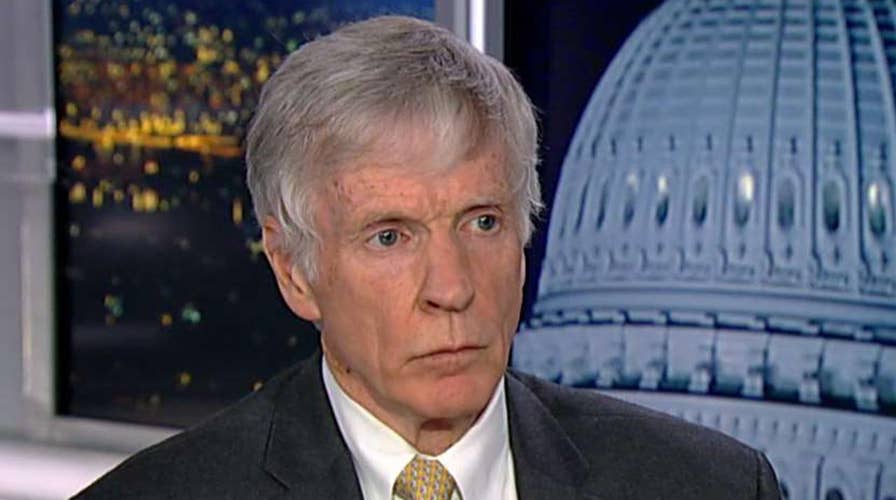Former US ambassador to Afghanistan on America's path forward in the region
Ryan Crocker says the U.S. does not have to turn into a defeated country in Afghanistan, urges the White House to stop the 'rush for the exits.'
While the world worries about U.S. policy in Syria, it would be wise pay at least as much attention to what happens in Afghanistan. It’s even more important that the Trump administration gets its policy exactly right there.
The U.S. reportedly has begun, quietly, to reduce its military presence in Afghanistan. If the administration fails to maintain a responsible, measured approach, sustaining our support for the Afghan people and protecting American interests, the consequences could be severe: increasing both instability in South Asia and the Islamist threat globally.
Make no mistake: Afghanistan is no Syria. Yes, Syria is a mess, too. And the Turkish incursion there has only made matters worse.
The withdrawal of U.S. troops in the face of Ankara’s action has sparked fears of ethnic cleansing, massive floods of refugees, and a comeback by ISIS. But America doesn’t appear to be walking away from the Middle East.
Washington is repositioning some of the forces to Western Iraq, where they will continue the same mission. And now there are reports that the U.S. might keep some limited forces in northern Syria to monitor the situation and coordinate anti-terrorism operations.
More from Opinion
However things shake out with U.S. forces in the Middle East, our response there should not be a blueprint for the way forward in Afghanistan.
The fate of Syria and its ruling Assad family has always been peripheral to American interests. The U.S. would likely not have gotten involved there were it not for the rise of the caliphate, Bashar Assad’s use of chemical weapons and the subsequent destabilizing flood of refugees. America can be a force for good in the Middle East without getting bogged down in Syria.
Afghanistan, on the other hand, has far more strategic relevance. Instability there can bleed over into the ongoing stand-off between India and Pakistan, both of which are nuclear powers. As the U.S. strategic partnership with India grows, contributing to regional stability helps make India a less distracted partner for our joint work in building a “free and open” Indo-Pacific.
CLICK HERE TO GET THE OPINION NEWSLETTER
We also have to be concerned about Afghanistan again becoming a platform for transnational terrorism. The U.S. has a broad footprint in the Middle East; it can continue the fight against Islamist terrorists from a variety of bases scattered throughout the region.
In South Asia, on the other hand, our military foothold is limited to Afghanistan. If we significantly draw down our counterterrorism force there, we will be fighting blind in South Asia. Those are the same conditions we faced right before 9/11.
Another key difference from the situation in Syria: In Afghanistan, the U.S. has a real partner. It's a legitimate government with a legitimate military fighting for the defense of the whole country. Indeed, in the last few years, the Afghans have largely carried the fight for their freedom. The small number of U.S. troops provide advice and support to the Afghan military — and conduct a counterterrorism mission.
While the U.S. foothold in northern Syria was tenuous at best, the American presence in Afghanistan is welcome and secure. And it is working.
Critics argue the Afghans aren’t winning the war. Perhaps that’s true, but neither are the Taliban. Since 2014, the Taliban has not registered a single substantial battlefield victory, even though the U.S. reduced its presence by over 80 percent during that period.
A January 2019 U.S. report estimates that, as of Oct. 2018, only 11 percent of the Afghan population lived in Taliban-controlled areas. Nearly two-thirds lived in areas controlled by the government. If the Taliban were winning, they would have never come to the negotiating table.
CLICK HERE TO GET THE FOX NEWS APP
The U.S. has long-standing plans to draw down our forces to just under 10,000 troops. But the intent was always to keep that lesser contingent in the country — to continue supporting the Afghans and fighting terrorists — even if a peace deal is reached. It’s a number that is without question both sustainable and able to make a real difference.
It remains to be seen what deal, if any, can be reached with the Taliban in the future. But whatever happens at the negotiating table, U.S. national security interests require that we keep a right-sized military presence in Afghanistan.









































